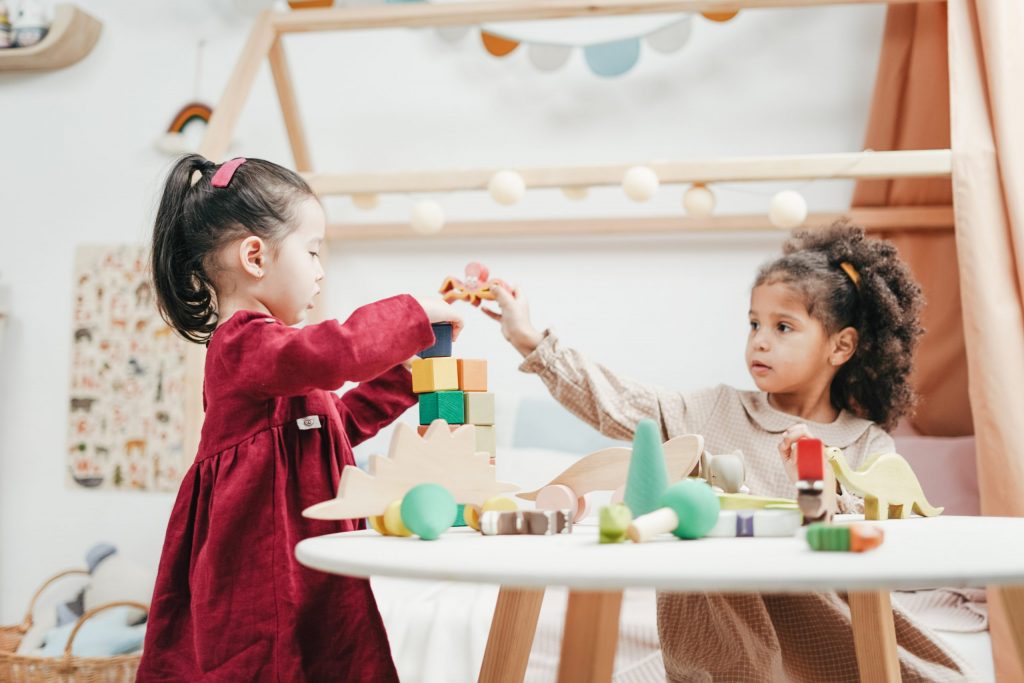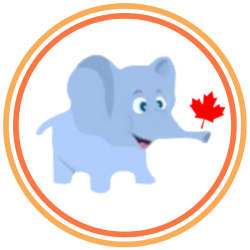About Toddlers Programs
Intentional Play Based Curriculum
We support the “Intentional and Purposeful Play Based Learning” that has been endorsed by the Ontario Government– Today’s Play ……Tomorrow’s Success! Today’s play in early childhood is the best foundation for success in school. Play develops many skills that are necessary for children to learn to read and write for success in math and science. Play develops behaviors that help children learn all school subjects. We observe children playing both indoors and outdoors in different types of play. We are able to access children’s growing abilities to direct their own play. As children begin to play interactively, we see growth in their abilities to follow the rules of a game, to take turns, to share materials, and to begin to cooperate, solve problems that emerge during play. Through play, children actively pose problems, explore solutions and develop understanding of real world concepts of form and function. By comparing information gained from each new experience to what they already know, they are actively constructing their knowledge of the way the world works.

Play is an active, child-initiated process that supports children’s learning throughout the domains of physical, social/emotional, creative, science, math, language and literacy. By taking advantage of the highly engaging nature of children’s self-sustained play, and using this as a jumping off point for a deeper exploration of the science concepts involved, staff can generate curriculum units that both integrate child-centered play and maximize children’s learning throughout these domains. By thoughtful planning and the use of significant strategies to enhance children’s play experiences, they can integrate specific learning goals and objectives for the group and for individuals, dramatically enhance children’s learning, and meet standards for preschool outcomes in all areas.
The Educators and/or Supervisor will send pictures of your child at play in the classroom whenever they can and connect it to the ELECT document (Every Learning for Every Child Today- A framework for Ontario early childhood settings). Activities are posted on Blue Elephant Face book page and/or on Blue Elephant Instagram page (no faces of children as per our Photo and Video policy).
A Happy Adjustment
We welcome new parent/guardians and arrange tours. We support and encourage parents to bring in their child for some pre-visits outdoors or indoors before a child starts his/her placement at Blue Elephant Daycare.
Our Educators will be happy to send photos and videos of your child during the day once your child’s placement begins with us. As a parent, you are welcome to call to talk to the Educator. Take a few moments to share information about your child in the beginning or end of the day to the person receiving your child as that will help us get to know your child or make adjustment easier ie: she likes to be rubbed in the back at nap time or he does not like the sound of a fire truck as it scares him etc. Feel free to call the daycare at any time to check about your child’s day. Take the time at drop off to relay any pertinent information about your child that occurred especially relating to health or send us an email at info@blueelephantdaycare.com.
Programs Offered:
We offer a Toddler and Pre-School program. We provide excellent opportunities for each child to develop and grow to his/her potential in a fun, safe and caring atmosphere. We offer part-time programs with limited placements. For parents who have their child on a part time program, there is no make-up day due to a statutory holiday. The part time days that are chosen are fixed so please do not change days of attendance as it does affect the ratios in the room. Thanks for your cooperation.
Toddler Program (18 months to 30 months) – There are 2 toddler program rooms each licensed for 10 children
Total Licensed capacity for Toddlers: 20 children. Ration of teacher to child: 1: 5
20% mixed age grouping ie. Can accept 2 children under 18 months in each classroom. We suggest 15 months and makes it easier if they are walking
Transition into our child care setting
Starting your child in a new facility can be lead to separation anxiety for you as parent and your child. It is very natural for your child to be upset when separating from you in the first few weeks. This is very normal and every child experiences it in a different way or different degree. Your child will have moments in the day when he/she cries during the adjustment period. Our Educator do their very best in ensuring your child feels safe, secure and cared for in friendly environment. Our Educators will redirect the child, provide an activity of interest to the child to distract the child. We have a great group of teachers who are trained and sensitive to your child’s needs. Staff are there to support your child in adjusting and during the separation process.
For the adjustment to be easier, explain to the child where they are going, what activities they will engage in etc. and once placement starts that you will be back to pick them at end of day. By returning early for the first few sessions, your child will understand that you will return.
Toddler Program
Toddler hood is a precious stage where a child explores and discovers, is introduced to new people, places and experiences. Activities that are planned by staff are based on your child’s interests to the age and ability of each child involving the senses and motor skills. As teachers we want to provide an environment where the children feel safe and have an enjoyable and stimulating experience. The children are exposed on a daily basis to a variety of activities that enhance their learning. In our toddler program, we encourage speech, language and hearing as well as an awareness of things around them. By 18 months they communicate with ten words, follow simple directions i.e.; show me your nose, recognize names of objects i.e.: car, table. By 24 months we encourage them to interact and communicate and build social skills. They are able to use a two word combination i.e.: my hat. They can follow a two step command i.e.; put teddy in bed. They become more aware of shapes, colors and numbers in the environment. We promote self help skills encouraging them to feed themselves dress themselves, wash hands themselves. They start to become more confident and self esteem builds. They also learn to cooperate, share toys and take turns. Teachers work with the Toddlers in small groups.
Domain and Skills being observed: (reference made to the document Every Learning for Every Child Today – A framework for Ontario early childhood settings January 2007) – 14 months to 3 yrs
Social: social interest, perspective taking, parallel play following physical distancing
Emotional: expression of feelings, self-regulation (emotional regulation, behaviour regulation, attention regulation), empathy, sense of self, autonomy, identity formation
Communication, language and literacy skills: Receptive language skills, expressive language skills (words, sentences, vocabulary, questions, conversation)
Cognition: Self-regulation (attention regulation), problem solving, cause and effect exploration, spatial problem solving, temporal, symbolic thought, representation and root skills of literacy, memory, sorting
Physical: Gross motor (balance, jumping, walking and running, climbing, riding toys, fine motor (dressing, eating, tool use, making a mark, pincer grasp), senses (sensory exploration, sensory discrimination, sensory motor integration)
Potty Training: Every child’s readiness to be potty trained is different. Here are some signs that will help you know when he/she is ready:
- dry diaper for three hours or more or dry overnight
- child can verbalize they want to “go”
- shows an interest in wanting to go sit on the potty
Please discuss your child’s potty training with the teacher or supervisor via phone or email. As much as this process is encouraged from home, we will work with you and be consistent in following through with the same method of training. Be sure to bring lots of change of clothes because accidents are bound to happen until age five.
Items to bring with you to leave at the daycare:
- three complete change of clothes (socks, pants, shirt, undershirt – based on season)
- diaper cream (if used) with your child’s name marked and labeled
- Pack of diapers (child used 5 to 6 diapers per day)
- Blanket with child’s initials on it. (no pillows please). Blanket will be washed here every Friday or sooner if needed.
- Suitable outdoor winter clothing such as boots, hat, mittens, scarf, snow pants, jacket or snow suit
- Suitable outdoor summer wear such as comfortable closed footwear, hat, light jacket for rainy days or sweater
- Sunscreen with your child’s name labelled on it. Parents to apply sunscreen before drop off. Teacher applies sunscreen before going outdoors in the afternoon. Make sure sunscreen is nut free.
- 2 Sippy cups for water and milk with child’s name labelled on it. (only for Toddlers)
- Bottle (for milk if child still using one) with your child’s name labeled on it.
- 5 Bibs (this gets washed at the daycare) with child’s name on it
- Soothers or pacifiers if the child uses (5) with storage container with child’s name on
